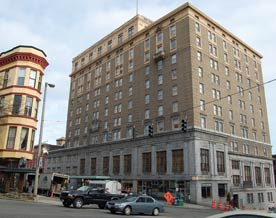The Winthrop, a grand hotel converted to affordable housing in the 1970s, was at the center of a conflict between the city’s hopes for a “revitalized” urban core and the residents of 190 low-income apartments who called the Winthrop home.
At 6 a.m. on a Monday morning, most places in downtown Tacoma are still hours from opening, but throughout autumn 2006, one coffee shop in this port city on Washington State’s Puget Sound opened early for a thriving community discussion about a single building that has, for more than 80 years, served as an anchor to the downtown.
Built in the 1920s, that building, the Winthrop, was born because Tacomans believed they needed a four-star hotel to live up to the city’s self-proclaimed moniker — the City of Destiny. The moniker came about when Tacoma was the terminus of the northern transcontinental railroad, a short-lived status as the line was soon extended to Seattle. With so much activity and population shifted to their neighbor to the north, Tacoma lacked the development that would bring big city amenities like a luxury hotel.
The 12-story brick building named for Theodore Winthrop, an explorer whose 1850s travelogue sparked interest in settling the Sound, was erected in the heart of Tacoma’s Theater District and, thanks to its scale, beauty, and age, defines the neighborhood. But while Tacomans wanted a luxury hotel, travelers weren’t interested, and the Winthrop struggled to make money.
With two neighboring miltary bases and the massive Port of Tacoma, the city’s residents were largely blue collar, but their jobs weren’t downtown. Residents, businesses, and retail left downtown for malls and suburbs in the 1960s; jobs moved to Seattle and residents began commuting up Interstate 5; and downtown Tacoma emptied. With very little downtown, let alone travelers, the hotel was converted to federally subsidized housing in the 1970s.
It has stayed that way for nearly 30 years.





Comments